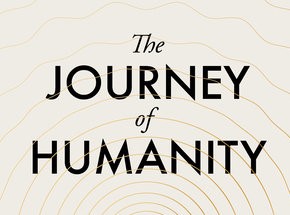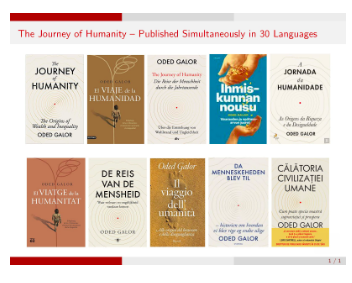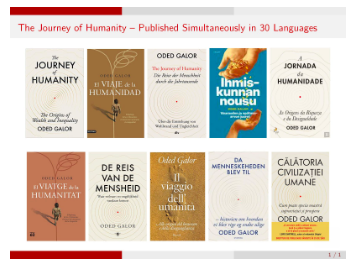New book published in 30 languages. It studies the driving forces and long-run perspectives of the journey of mankind. We discuss major points with the author in an interview (see below).
- Oded Galor : The Journey of Humanity. The Origins of Wealth and Inequality, 2022.
- More information: Amazon — Penguin Random House
- VIDEO of the GLO online event with Oded Galor presenting the book on 21 March 2022 (Report).



Oded Galor is
- Herbert H. Goldberger Professor of Economics at Brown University
- the founding thinker behind Unified Growth Theory, which seeks to uncover the fundamental causes of development, prosperity and inequality over the entire span of human history.
- Editor-in-Chief of the Journal of Economic Growth and an Editor of the Journal of Population Economics.
INTERVIEW
GLO: What brought you to focus your research on long-term roots of the history of mankind?
Oded Galor: I was born and raised in Jerusalem, and perhaps not surprisingly given the inescapable historical context of daily life in the city, I have developed a great affinity to the understanding of the roots of human behavior and the historical origins of religiosity, ethnicity, diversity, and the lasting impact of historical factors on human prosperity.
During my academic career, I was intrigued by the origins of inequality in the wealth of nations, and this curiosity gravitated me over time towards the field of Economic Growth. But, in contrast to the dominating trends in the late 1980s and early 1990s, my research in the field of economic growth was quite different. Rather than focusing on the notion of convergence, which is predicated naturally on the presumption that initial conditions do not matter in the long run, my research has focused on the understanding of the roots of inequality across nations and the role of initial conditions in the determination of the fate of nations.
My quest for the understanding of the vast inequality in the wealth of nations led ultimately to my creation of Unified Growth Theory. The development of this theory was fueled by the conviction and the evidence that a comprehensive understanding of global inequality would not be feasible in the absence of a theory that would reflect the principal driving forces behind the entire process of development and capture the central role that historical and pre-historical factors have played in bringing about the current disparities in living standards.
Along this process, I developed a great passion to the mathematical fields of dynamical systems and bifurcation theory, which underlines the importance of initial conditions in the determination of long-run position of complex systems. These important mathematical tools have enabled me to develop the Unified Growth Theory and to resolve some of the most fundamental mysteries in the development process.
GLO: What story reveals your recent book, ‘The Journey of Humanity’?
Oded Galor: The book explores the evolution of human societies since the emergence of Homo sapiens in Africa nearly 300,000 years ago. It resolves two of the most fundamental mysteries that surround this journey:
- The mystery of growth – what are the roots of the dramatic transformation in living standards in the past 200 years, after 300,000 years of near stagnation. Why, in the past 200 years, has income per capital in the world increased 14-fold and life expectancy more than doubled, after 300,000 years of minuscule progress in these dimensions?
- The mystery is inequality – what is the origin of the vast inequality in living standards across countries and regions and why has this inequality increased so dramatically in the past 200 years?
The book advances a revolutionary perspective about the origins of wealth and global inequality. It suggests that much of the inequality in the wealth of nations can be traced to historical and pre-historical forces that operated hundreds of years ago, thousands of years ago, and even tens of thousands of years ago.
GLO: The Malthusian poverty trap: How did we got out of this according to your ‘Unified Growth Theory‘?
Oded Galor: Ever since the emergence of Homo sapiens and development of the first stone-cutting tool, technological progress fostered the growth and the adaptation of the human population to its changing environment. In turn, growth and the adaptation of the population widened the pool of inventors and expanded the demand for innovations, further stimulating the creation and adoption of new technologies. Nevertheless, over most of human existence, one central aspect of the human condition remained largely unaffected: living standards. Innovations stimulated economic prosperity for a few generations, but ultimately, population growth brought living conditions back towards subsistence levels.
For millennia, the wheels of change – the reinforcing interplay between technological progress and the size and composition of the human population – turned at an ever-increasing pace until, eventually, a tipping point was reached, unleashing the rapid technological progress of the Industrial Revolution. The increasing demand for skilled and educated workers who could navigate this rapidly changing technological environment incentivized parents to invest in the education of their children and therefore to bear fewer of them. Fertility rates started to decline and living standards improved without being swiftly counterbalanced by population growth, and thus began a long-term rise in human prosperity that the world has experienced in the past two centuries.
GLO: You conclude that instead of the predicted communist revolution, industrialization lead to mass education. Why was Marx wrong?
Oded Galor: Marx maintained that the intensifying competition among capitalists would result in a reduction in their profits, inducing them to deepen the exploitation of workers. He argued that class struggle would therefore be inevitable since society would necessarily reach the point where the ‘proletarians have nothing to lose but their chains’.
Nevertheless, contrary to Marx’s hypothesis, the transformation of the production process in the course of the Industrial Revolution made education a critical element in boosting industrial productivity and maintaining profit rates. Education and the skills of the workforce became increasingly more important to the capitalist class, as they came to realize that education held the key to preventing a decline in their profit margins. They have therefore lobbied forcefully for the provision of public education for the masses. Hence, instead of a communist revolution, industrialization triggered a revolution in mass education.
GLO: Why has the industrialization over the last two centuries brought amazing growth but also huge global inequality?
Oded Galor: Intriguingly, when prosperity skyrocketed in recent centuries, it did so earlier in some parts of the world, triggering a second major transformation: the emergence of immense inequality across societies. Institutional, cultural, geographical and societal characteristics that emerged in the ancient past propelled societies on their distinct historical trajectories, influenced the timing of their escape from the epoch of stagnation, and contributed to the gap in the wealth of nations.
GLO: Why is global inequality so persistent and received strategies like the ‘Washington Consensus‘ with a set of universal structural reforms in your view a fundamental misconception?
Oded Galor: Privatization of industry, trade liberalization and secure property rights might be growth-conducive policies for countries that have already developed the social, cultural and educational prerequisites for economic growth, but in environments where these foundations are absent, where social cohesion is tenuous and corruption well entrenched, such universal reforms have often been fruitless.
Institutional, cultural, geographical and societal characteristics that emerged in the distant past have propelled civilizations through their distinct historical routes and fostered the divergence in the wealth of nations. Incontestably, cultures and institutions conducive to economic prosperity can be gradually adopted and formed. Barriers erected by aspects of geography can be mitigated. But any such interventions that ignore the particular characteristics that have emerged over the course of each country’s journey are unlikely to reduce inequality and may instead provoke frustration, turmoil and prolong stagnation.
GLO: Where does your interest and concern about inequality come from? How does inequality in the distribution of wealth affect growth?
Oded Galor: My long-term interest and concern about inequality has been based on my personal moral conviction as well as the understanding of potential adverse effect of inequality on economic prosperity. Wealth inequality is associated with inefficient education and investment decisions of the poorer segments of society. It has therefore an adverse effect on the allocation of talents across occupations and it reduces economic efficiency. In addition, it adversely affects social cohesiveness and is associated with civil unrest and therefore loss in productivity. Thus, despite the importance of wage inequality in generating the proper economic incentives, it is quite apparent that excessive wealth inequality adversely affects ‘equality of opportunity’ in society and is therefore both unjust and harmful for economic efficiency and social cohesiveness.
GLO: How do you differentiate your contribution from the bestselling work of Yuval Noah Harari (‘Sapiens. A Brief History of Humankind’)?
Oded Galor: The Journey of Humanity consists of two major parts. The first part examines the progression of humanity, as a whole, since the emergence of Homo sapiens in Africa nearly 300,000 ago. The scope of this part has some parallels to “Sapiens”, but it is fundamentally different conceptually and scientifically. It is based on Unified Growth Theory, which identifies the wheels of change that have governed the journey of humanity over the entire course of human history. Each of the building blocks of this theory is evidence-based, founded on rigorous empirical analysis. In contrast, many of the critical transitions in “Sapiens” are largely speculative, and as the results of UGT reveal, its basic premise— that humanity progressed gradually since the agricultural revolution— is counter-factual. Moreover, The Journey of Humanity highlights the demographic forces that are central for the understanding of the Malthusian trap, as they have characterized 99.9% of human history and ultimately the take-off from stagnation to growth. This factor, however, is absent in “Sapiens”.
The second part of the Journey of Humanity explores the origins of inequality across countries. It highlights the role of institution, culture, geography, and human diversity in the divergence in the wealth of nations in the past 200 years. It leads into important policy implications about the vital role of gender equality, tolerance, and diversity in the future prosperity of humanity and the importance of the history of each individual country in the design of policies that could mitigate inequality across nations. This important analysis about the roots of inequality between nations is also absent from “Sapiens”.
As the author of “Origins”, Lewis Dartnell wrote: “if you like Sapiens you will love [The Journey of Humanity].
GLO: Your book feeds the hope for a long-term rise in humanity, of increased wealth, understanding and collaboration.
- On p. 9 you write: “…. the outlook derived from this exploration can be described as fundamentally hopeful, in terms of the overarching trajectory of societies across the globe. ….education, tolerance and greater gender equality hold the keys to our species’ flourishing in the decades and centuries to come. ”
- And after discussing major global catastrophes over the last century, you write on pp. 242-243: “But history shows that, shattering and dreadful as they are, these events have had limited long-term impact on the grand arc of human development. The relentless march of humanity has so far been unstoppable.”
How does this fit with the Russian invasion of the Ukraine, which appears to many, like a game-changer of history?
Oded Galor: In fact the current crisis has reinforced my confidence about the relentless march of humanity. It is quite apparent that the Russian invasion to Ukraine has clarified to individuals across the globe that their liberties are at risk, and unless the forces that cherish freedom would unify, totalitarian regime may prevail and derail humanity from its promising march. And indeed, we have witnessed unprecedented unity within the European continent and even between the deeply polarized US society. As was the case in the course of human history, therefore this dreadful event is very unlikely to affect the grand arc of human development, and humanity may emerge from this crisis stronger than otherwise, as totalitarian regimes will recede further.

******
Oded Galor was interviewed by Klaus F. Zimmermann, GLO President.
Ends;

